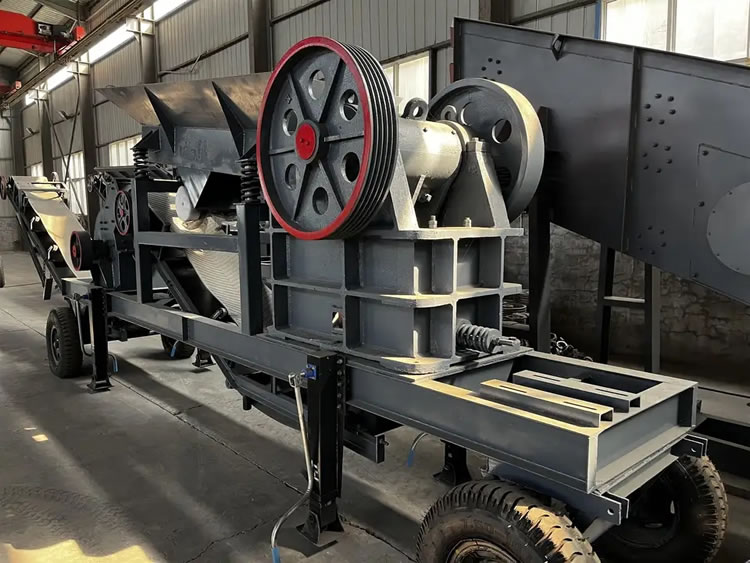


In the heart of Central Asia, where natural resources are abundant and industrial growth is rapidly evolving, Kyrgyzstan stands at a crossroads in its quest to harness these resources efficiently. One significant aspect of this development is the processing of hard materials, such as rocks, minerals, and other aggregates. Among various technologies available, the mini sand making machine has emerged as a pivotal choice for Kyrgyzstan's industries. This article delves into why this compact yet powerful piece of equipment is becoming increasingly popular among Kyrgyzstan's businesses and explores its benefits, applications, and future prospects.
Understanding the Mini Sand Making Machine
A mini sand making machine, also known as a vertical shaft impact (VSI) crusher, is designed to produce fine aggregates or artificial sand by crushing larger stones. Unlike traditional jaw or cone crushers, which primarily break down large rocks, VSI crushers focus on producing high-quality sand with a consistent gradation. These machines operate by accelerating materials to high speeds and then colliding them with a fixed anvil or another material, resulting in finely crushed particles.
Why Kyrgyzstan Chooses Mini Sand Making Machines
Economic Viability
One of the primary reasons for the popularity of mini sand making machines in Kyrgyzstan is their economic viability. These machines offer a cost-effective solution for producing high-quality sand compared to traditional methods. They require less energy, have lower maintenance costs, and can be operated with minimal supervision. For a country like Kyrgyzstan, where infrastructure development is crucial, investing in affordable yet efficient technology is paramount.
Environmental Sustainability
Environmental concerns are gaining prominence globally, and Kyrgyzstan is no exception. Mini sand making machines contribute positively to environmental sustainability by reducing the need for natural sand extraction, which often leads to habitat destruction and ecological imbalance. By utilizing locally available hard materials, these machines help conserve natural resources and minimize the carbon footprint associated with transportation.
Versatility and Efficiency
The versatility of mini sand making machines makes them suitable for a wide range of applications. Whether it's construction, road building, or manufacturing, the demand for high-quality sand remains constant. These machines can process various types of hard materials, including limestone, granite, basalt, and even recycled concrete, providing flexibility to industries. Their ability to produce sand with consistent particle size distribution ensures superior performance in end products.
Compact Design and Easy Installation
Space constraints are a common challenge in many industrial settings. Mini sand making machines address this issue with their compact design, making them easy to install even in limited spaces. Their small footprint does not compromise on performance, allowing businesses to maximize output without requiring extensive infrastructure investments.

Applications of Mini Sand Making Machines in Kyrgyzstan
Construction Industry
The construction boom in Kyrgyzstan demands a steady supply of high-quality aggregates. Mini sand making machines play a vital role in producing fine sand for concrete, mortar, and plaster, ensuring structural integrity and longevity of buildings. With urbanization on the rise, these machines support the construction of residential complexes, commercial buildings, and public infrastructure projects.
Road and Highway Development
Road construction is another area where mini sand making machines prove invaluable. Fine aggregates produced by these machines are used in road base layers, asphalt production, and concrete pavements. Their ability to produce uniform sand enhances the durability and load-bearing capacity of roads, contributing to safer and more efficient transportation networks.
Manufacturing Sector
Industries such as ceramics, glass, and foundry rely heavily on silica sand as a raw material. Mini sand making machines provide a reliable source of high-purity silica sand, meeting the stringent quality requirements of these sectors. This not only supports local manufacturing but also reduces dependence on imported raw materials.
Future Prospects and Challenges
As Kyrgyzstan continues to embrace industrialization and modernization, the demand for mini sand making machines is expected to grow. However, challenges such as technological advancements, operator training, and after-sales service must be addressed to fully capitalize on their potential. Collaborations between local manufacturers and international technology providers can pave the way for innovation and skill development in this sector.
Moreover, as environmental regulations become stricter, the eco-friendly nature of mini sand making machines will further solidify their position as the preferred choice for hard material processing in Kyrgyzstan. Government initiatives promoting sustainable development and investment in green technologies will likely boost the adoption of these machines across various industries.
Conclusion
Kyrgyzstan's choice of mini sand making machines for hard material processing reflects a strategic decision aimed at balancing economic growth with environmental responsibility. These compact yet powerful devices offer a cost-effective, versatile, and sustainable solution for producing high-quality sand, catering to the diverse needs of the construction, road development, and manufacturing sectors. As the country progresses towards industrialization, mini sand making machines are poised to play a pivotal role in shaping its future, fostering innovation, and contributing to sustainable development goals.